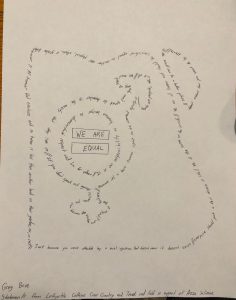As my final week of my vegetarian journey comes to a close, I have ultimately realized that this lifestyle could be very practical for me long term. My body has completely adjusted to the dietary changes, and I feel better than I ever have before. I have a strong feeling I’ll continue sticking to this lifestyle from here on out.
On my previous post, I discussed the topic of iron related issues that can arise throughout one’s transition into vegetarianism. On that post, I received a comment from someone asking if I could further address the possible money related issues regarding vegetarianism.
When tackling the reasons for why the rates of vegetarianism is so low in the US, I immediately assumed one reason could be that it takes less meat to fill you up than vegetarian food, which made me believe that it would ultimately be cheaper to follow a diet containing meat vs not. I also came to this conclusion off of the fact that the menus at fast food chains (which more than 1 in 3 americans eats at on a given day) contain little to no fruits and vegetables. Since the food items at those chains are so low, I figured their ability to make their prices so low correlated with their lack of vegetarian items. It turns out my assumptions are actually completely false.
Vegetarianism can be a somewhat harder diet to follow for numerous reasons, like the effort it takes to prepare delicious & filling vegetarian dishes, but the idea that maintaining a vegetarian diet is proportionally more expensive than meat is simply false. In a study posted in the Journal of Hunger & Environmental Nutrition, it concluded that not only are vegetarian diets linked with better overall health, but that vegetarians (on average), save about $750 more per year than meat eaters. The vegetarian diets this study was based off of not only costed much less, but also contained much higher amounts of nutrition (via fruits, veggies, and whole grains) within its 2,000 calories when compared to the regular diet. A misconception about people following a vegetarian diet is that one must shop solely at Whole Foods and Trader Joe’s and buy all organic food in order to be a successful, satisfied vegetarian. But in reality, as long as your diet follows the no meat rule, you can utilize any and all things in the grocery store, organic or not.
Often times, food companies will stamp “organic” on their product, allowing themselves to increase the price. Though there are varying opinions regarding the actual value of organic vs. inorganic food, if you’re trying to save money, there’s truly no harm in buying non-organic stamped food. Pasta, dairy, pizza, eggs…etc. The vegetarian diet isn’t, and shouldn’t be considered restricting. The bottom line here is that prior to (my) prior belief, following a vegetarian diet does not mean spending higher amounts of money per year, and if you do it smartly, you could end up saving lots.
